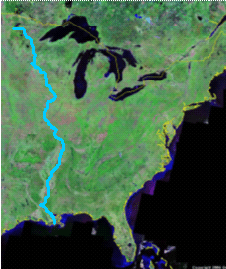BY STAS MARGARONIS
American Commercial Barge Line (ACBL) reported on October 6th that Mississippi river vessels are experiencing: “Historic low water conditions” and that “River levels continue to fall on the Mississippi River with severe impacts to navigation not seen since 1988.”
ACBL reported: “Industry is expecting catastrophic impacts to boat capacity, which will in turn drastically decrease ton-mile productivity for the inland rivers.”
American Commercial Barge Line (ACBL) is one of the largest and most diversified marine transportation companies in the U.S. and is based in Jeffersonville, Indiana.
ACBL also noted:
- The company is working to crew all available boats and mobilize equipment to combat these conditions.
- Industry has reduced the loading drafts to 9’6″ as of September 27th. This change reflects a 20-27% reduction to tons per barge versus normal conditions.
- The company is planning to move barges “in our network loaded prior to this change per the below guidance.” As a result:
- Barges up to 10′ 0′ will continue to move from Cairo South.
- Barges between 10′ 0′ and 10′ 6″ will continue to move from Rosedale South.
- No barges over 10′ 6″ will be moved until further notice.
- Industry has agreed to 25-barge max tow size reflecting a 17-38% reduction in tow size.
- Groundings have been driving intermittent closures of 12-36 hours daily over the past three weeks.
- Docks and harbors may see further draft restrictions locally, some reportedly at 7′ max.
- U.S. Army Corps of Engineers “is engaging additional buoy boats to improve navigational aids as well as two dredges” and “Dredging activities expected to drive full closure periods to transit during this event.
- Finally the company said “Expect these issues to continue through October based on forecasted precipitation.”
In the meantime, Ingram Barge Company, one of the country’s largest barge shippers, said Thursday October 6th that it was “prodding formal notice of a force majeure event” as low water on the Mississippi River disrupted its operations, according to Reuters.
The declaration would affect the portion of Ingram’s operating network at locations downriver from Baton Rouge, Louisiana, Ingram Barge Chief Executive John Roberts said in an emailed statement.
The Associated Press reports that The unusually low water level in the lower Mississippi River is causing “barges to get stuck in mud and sand, disrupting river travel for shippers, recreational boaters and even passengers on a cruise line.”
The report went on to note:
- Lack of rainfall in recent weeks has left the Mississippi River approaching record low levels in some areas from Missouri south through Louisiana.
- The U.S. Coast Guard said at least eight “groundings” of barges have been reported in the past week, despite low-water restrictions on barge loads.
- One of the groundings happened Friday between Louisiana and Mississippi, near Lake Providence, Louisiana. It halted river traffic in both directions for days “to clear the grounded barges from the channel and to deepen the channel via dredging to prevent future groundings,” U.S. Army Corps of Engineers spokesperson Sabrina Dalton said in an email.
- As a result, dozens of tows and barges were lined up in both directions, waiting to get by.
- The stoppage also brought a halt to a Viking cruise ship with about 350 passengers on board, said R. Thomas Berner, a Penn State professor emeritus of journalism and one of the passengers.
Bloomberg reported that “The logjam is coming at the worst time as the soybean and corn harvests are each about one-fifth complete and supplies will start piling up. The river woes, coupled with a soaring dollar, are destroying demand for US supplies even with Russia’s invasion of Ukraine still impeding shipments in the Black Sea.”
Bloomberg cited the following:
- “We’re losing demand because of reduced export capacity,” Susan David, grain analyst in St. Louis, said by phone. “We’re creating piles everywhere.”
- The Coast Guard said there was a queue of 122 vessels at Stack Island and 15 vessels at Memphis. Due to increased groundings, the number of vessels in tow is being restricted.
- Meanwhile, any snags in fertilizer shipments — which farmers rely on to plant crops for next year — are happening as nutrients to grow food have soared and as Hurricane Ian temporarily shut production at a Mosaic Co.fertilizer plant in Florida.

